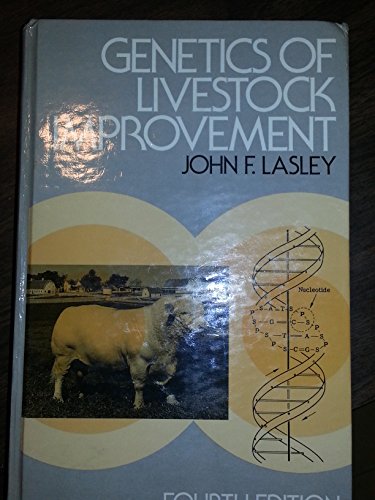Sustainable Livestock Breeding And Genetics Improvement
Genetics of Livestock Improvement is a fascinating book that delves into the intricate world of genetics and its impact on livestock. This book, written by Lasley, provides invaluable insights into the field of genetics and its application in improving the quality and productivity of livestock. With a profound understanding of genetics, Lasley explores various techniques and methodologies that contribute to the overall improvement of livestock.

Throughout this book, Lasley highlights the importance of genetics in livestock improvement, presenting complex concepts in a manner that is easily understandable to readers. The author's expertise in the field shines through as he provides detailed explanations and real-world examples to support his arguments.
What is genetics? It is the study of genes and heredity, focusing on how traits are passed from one generation to another, both in humans and animals. When it comes to livestock improvement, genetics plays a crucial role. By understanding the genetic makeup of different species, breeders can make informed decisions when selecting animals for breeding programs.
Ideas for livestock improvement are vast and varied. With advancements in technology and research, breeders now have access to tools and techniques that were unimaginable just a few decades ago. One such technique is genetic engineering, which allows scientists to alter the genetic makeup of animals to enhance desirable traits. Genetic engineering has proven to be a game-changer in livestock improvement, offering immense potential for boosting productivity and overall quality.
When it comes to recommendations for livestock improvement, it is crucial to consider the ethical implications. As we delve into the realm of genetic engineering and other advanced techniques, ethical concerns arise. It is vital to strike a balance between improving livestock and ensuring their well-being. The welfare of animals should always be a top priority when implementing any genetic improvement programs.
Listicle of tips for genetic improvement:
- Understand the genetic potential of your livestock.
- Implement selective breeding programs.
- Conduct thorough genetic evaluations.
- Consider crossbreeding for hybrid vigor.
- Utilize genetic engineering techniques responsibly.
- Invest in genetic testing and screening.
- Educate yourself about the latest advancements in genetics.
- Collaborate with experts and researchers in the field.
- Monitor and track genetic progress.
- Continuously review and update your breeding strategies.
Question & Answer:
Q: How can genetics improve livestock?
A: Genetics can improve livestock by selectively breeding animals with desirable traits. By understanding the genetic makeup of different species, breeders can make informed decisions to enhance productivity, disease resistance, and overall quality.
Q: What are some ethical concerns in genetic improvement of livestock?
A: Some ethical concerns include the welfare of animals, potential harm caused by genetic manipulation, and the impact on biodiversity. It is crucial to strike a balance between genetic improvement and animal welfare while considering the long-term implications.
Q: What role does genetic engineering play in livestock improvement?
A: Genetic engineering offers a powerful tool for livestock improvement. It allows scientists to introduce specific traits into an animal's genetic makeup, enhancing desirable characteristics such as disease resistance, growth rate, and milk production.
Summary of Genetics of Livestock Improvement:
Genetics of Livestock Improvement, authored by Lasley, sheds light on the intricate world of genetics and its essential role in improving livestock. Through detailed explanations and real-world examples, Lasley highlights the potential of genetics in enhancing productivity and overall quality in the livestock industry. By understanding the genetic makeup of different species, breeders can make informed decisions to create healthier, more productive animals.
In conclusion, Genetics of Livestock Improvement is a must-read for anyone interested in the field of animal genetics and livestock improvement. Lasley's expertise in the subject shines through, making complex concepts accessible to readers. This book serves as a valuable resource for breeders, researchers, and anyone passionate about enhancing the quality and productivity of livestock through the power of genetics.

Post a Comment for "Sustainable Livestock Breeding And Genetics Improvement"